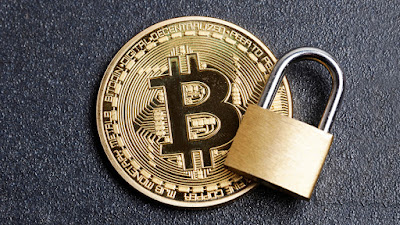HOW DO YOU STORE YOUR BITCOINS
Before you own bitcoin, you need to have a place to store it. This place is called a "wallet."
Instead of holding your bitcoin, it holds the private key that allows you to access your bitcoin
address (which is also your public key). If the portfolio software is well designed, it will give the
impression that your bitcoins are actually there, making using bitcoins more convenient and intuitive.
In fact, a portfolio usually contains several private keys, and many bitcoin investors have multiple
portfolios.
Wallets can live either on your computer and/or mobile device, or on a physical storage gadget,
or even on paper. Here we will briefly look at the different types of portfolios.
Electro-wallet
Electronic wallets can be downloaded as software or hosted in the cloud. The first is simply a
formatted file that lives on your computer or device, and that facilitates transactions. Hosted
wallets (in the cloud) usually have a more user-friendly interface, but you'll entrust your private
keys to a third party.
Software portfolio
Installing a wallet directly on your computer gives you the security to control your keys. Most are
relatively easy to set up and are free. The downside is that they require more maintenance in the
form of backups. If your computer is stolen or corrupted and your private keys are not also stored
elsewhere, you lose your bitcoin.
They also require more important safety precautions. If your computer is hacked and the thief takes
your wallet or private keys, they will also take your coins.
The original software portfolio is the Bitcoin Core protocol, the program that runs the bitcoin network.
You can download it here (this doesn't mean you have to become a fully operational node), but you
also need to download the register of all transactions since the dawn of bitcoin time (2009). As you
can guess, it takes a lot of memory - at the time of writing, more than 145GB.
Most of the portfolios used today are "light" portfolios, or SPV (Simplified Payment Verification)
portfolios, which do not download the entire ledger but synchronize with reality. Electrum is a
well-known bitcoin desktop SPV portfolio that also offers a "cold room" (a totally offline option for
extra security). Exodus can track multiple assets with a sophisticated user interface. Some (such as
Jaxx) may contain a wide range of digital resources, and others (such as Copay) offer the ability to
share accounts.
Online wallet
Online (or cloud) wallets offer increased comfort - you can usually access your bitcoin from any
device if you have the right passwords. They are all easy to set up, have desktop and mobile
apps that make spending and receiving bitcoins easy, and most are free.
The downside is the low security. With your private keys stored in the cloud, you need to trust
the host's security measures, and that it won't disappear with your money, or will not close or
deny you access.
Some large online portfolios are tied to exchanges (such as Coinbase and Blockchain). Some offer
additional security features such as offline storage (Coinbase and Xapo).
Mobile wallets
Mobile wallets are available as apps for your smartphone, especially useful if you want to pay for
something in bitcoin in a store, or if you want to buy, sell or send on the go. All of the online
portfolios and most of the office portfolios mentioned above have mobile versions, while others
- such as Abra, Airbitz and Bread - were created with mobile in mind.
Hardware portfolios
Hardware wallets are small devices that occasionally connect to the web to conduct bitcoin
transactions. They are extremely safe because they are usually offline and therefore not hackable.
However, they can be stolen or lost, as well as bitcoins that belong to stored private keys. Some
large investors keep their hardware portfolios in safe places, such as bank vaults. Trezor, Keepkey
and Ledger and Case are notable examples.
Paper wallets
Perhaps the simplest of all wallets are pieces of paper on which are printed the private and
public keys of a bitcoin address. Ideal for long-term storage of coins (away from fire and water,
of course), or to offer coins as gifts, these wallets are safer because they are not connected to a
network. However, they are easier to lose.
With services such as WalletGenerator, you can easily create a new address and print the
wallet on your printer. Fold, hide and go. Send coins to this address, then store them safely
or give them away. (See our tutorial on paper wallets here.)
Are bitcoin wallets safe
It depends on the version and format you've chosen, and how you use them.
The safest option is an electronic wallet that you keep offline, in a safe place. This way, there
is no risk that your account will be hacked, your keys will be stolen and your coins will be
taken away. But if you lose the wallet, your coins disappear, unless you have created a clone
and/or kept reliable backup copies of the keys.
The least secure option is the online wallet, as the keys are held by a third party. It's also the
easiest to set up and use, as it offers you an all-too-familiar choice: convenience or security.
Many serious bitcoin investors use a hybrid approach: they hold a long-term base amount of
bitcoins offline, while having a "expense balance" for cash on a mobile account. Your choice
will depend on your bitcoin strategy and your willingness to obtain "technical" information.
Whichever option you choose, be careful. Save everything, and only tell your loved ones where
your backups are stored.



Comments
Post a Comment